01
Sowing the Seeds of a Storytelling Revolution
So much led up to it that first night, February 19th, 2010 at The Rosendale Theater in Rosendale, NY. It all seemed so haphazard at the time. It’s only in retrospect that it makes sense, so much so, it almost seems preordained.
There was no TMI Project yet. It was just a show called Too Much Information, thought to be a one-night-only affair. After the last storyteller took their bow, and the cast mingled with an electrified audience, I had a strong sense that it was not over but just beginning. Even with that inkling, I had no way to predict how much that night would change my life.
I have never been a stranger to holding people’s untold stories. I had grown up as the secret keeper in my family. At 11 years old, I listened in on a phone call and found out that my mother had a child when she was 16 whom she gave up for adoption. I was not to tell my younger sisters. I was the only one who knew there was a child missing at the dinner table; the only one who knew my mother was forced to give away one of her children. I grew up feeling immense pressure to keep the secret hidden, afraid that if I let it slip, I would be responsible for tearing apart my whole family.

Secrets have a way of snowballing. At 12 I started to binge eat as a way to stuff the secrets down. It was my first foray into addiction. I was brutally bullied for my weight. I stopped talking in school. I became suicidal. At 13, I discovered what food restriction felt like, and got high off of the control and new found attention. Alcohol quickly replaced food. With my mounting insecurity and need for external validation, I was perfect prey for predators and started being groomed by a high school teacher freshman year.
There were two things that got me through those early years: keeping a journal I shared weekly with an English teacher and starting a life-long love affair with theater. Writing down my story, sharing it with another human being, being seen, having my experience reflected back to me, having the release of getting on stage, and sharing my pent up emotions with a crowd who could, in turn, help me hold it all, saved my life.
I graduated high school in 1991 and moved to New York City to attend American Academy of Dramatic Arts. I didn’t want to audition for parts that didn’t mean anything to me, so instead of going the traditional route, I started The Women’s Experimental Theater Group, otherwise referred to as The W.E.T.G.irls. This was the ‘90s. The Gorilla Girls were making their mark all over NYC using stickers in public places to call out gender bias in the art world. Sex-positive activist and artist Annie Sprinkle was sprinkling all over the place and teaching us to do the same. Guiliani was shutting down strip clubs, and burlesque was on the rise. We partied at queer bars like The Cubby Hole, Henrietta Hudson’s, and The Clit Club and danced until the wee hours at various little hole-in-the-wall clubs littering the East Village. I went to Hunter College and majored in Women’s Studies and soaked up the works of Audre Lorde, bell hooks, Bella Abzug, and others. The Vagina Monologues debuted and quickly became a phenomenon. The W.E.T.Girls was embedded in this cultural landscape. We produced original works based on real life experiences. There was no developed methodology, but the seeds for TMI Project were being planted and taking root.
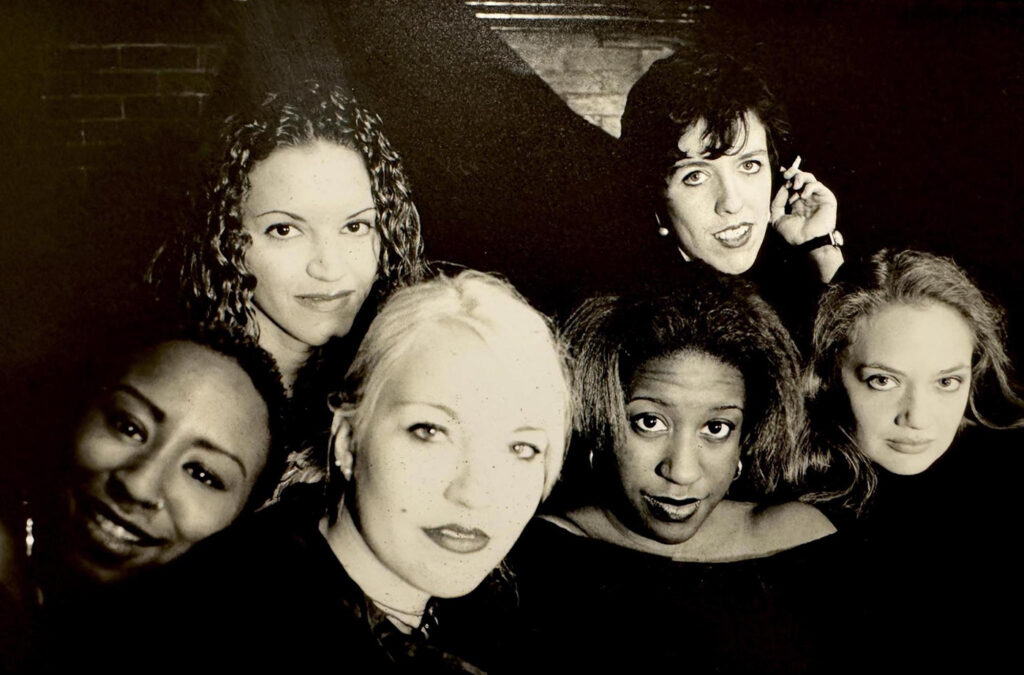
I left NYC in 2005, returned to the Hudson Valley, put down addiction, and picked up recovery. I resisted joining a recovery program for such a long time but was desperate. I put aside my misconceptions of what it had to offer me and claimed my seat. What I wasn’t prepared for was how mesmerized I’d be by the storytelling at the meetings. A dollar a day (or not), and I could have a front row seat for the most riveting storytelling performance in the world. People shared what it was like, what happened, and what it was like now. I listened to tales of survival and took notes. I couldn’t believe the details that were being shared in public. Furthermore, people received these outlandish admissions with a collective tear or a knowing laugh. I heard, “You are only as sick as your secrets,” and “share like your life depends on it.” Like so many others before me, I started to share my story. My life depended on it. As a result, I started to heal. I watched others do the same.
After living in NYC for well over a decade, clubbing, producing theater, and performing, I held the bougie belief that, now that I was sober and settling down in the country, my life was pretty much over. I went to meetings and lived one boring day at a time.
In 2008, I had a steady job selling advertising for a local arts rag. One afternoon, an email passed my desk stating a nearby nonprofit needed a director for an upcoming production of The Vagina Monologues. The proceeds were going to benefit United Way of Ulster County’s Raising Hope program, women mentoring women. I still had the timidness of someone learning how to re-enter the world, but I wanted it. I wanted to be creative and useful again. I pushed my fears to the side and went for it.
Not only did I land the job, I met Julie Novak. She bounded into the audition room and proceeded to blow me away. After she nailed the Elegant Moan, the Grace Slick Moan and the Mountaintop Moan, I cast her to read The Woman Who Loved to Make Vaginas Happy, and pulled together an amazing cast. I directed the show in 2008 and 2009. Julie won over the hearts of the audience every time, especially when she milked the final Surprise Triple Orgasm Moan, powerful enough to make the spotlight black out and reappear three times over.
The production raised a substantial amount of money for the partner organization, and in 2010 they asked me if we would do it again.
“Frankly,” I said, “I am vagina-ed out.” I had no idea that this would lead to a lifetime of telling the same story, regularly using the word “vagina” in the past tense. I then asked the question that changed everything. “Do you mind if this year we tell our own stories instead?”
Reluctantly, they agreed.
The cast and I met weekly at my house, sat in a circle on the living room floor, and wrote and read together. There was no longer a theme. We weren’t all telling stories about our unmentionables (or, as V (formerly Eve Ensler) had liberated us to say, our monkey box, coochie snorter, twat, cunt), but after some discussion, we realized we did have a common theme: we were all focusing on the parts of our stories that had previously been unspoken, the parts we usually left out. Once our stories were finished, we were left with the big question: “What should we call this show?” We almost settled on Act Normal. Thankfully, the brilliant hip-hop feminist and journalist Joan Morgan was part of the cohort and said, “What about Too Much Information? We’re all sharing the “TMI” parts of our stories.” And so, on February 19th, 2010 at The Rosendale Theater in Rosendale, NY we did a one-night-only performance called Too Much Information.
02
Truth Takes Root
The night of the first performance, I watched each storyteller transform before my eyes. Before they took to the stage they stood trembling in the wings. During the black out they each walked to the mic and took their place, inhaling a deep breath before the spotlight illuminated them, signaling there was no turning back. They faced their fear. One by one, they shared their truth. When they said their last words, the crowd burst into enthusiastic applause. As each storyteller was met with compassion and love instead of shame and judgement, they stood taller, shoulders back, heads held high. They took in the love and admiration from the audience. They returned backstage to their castmates feeling charged, receiving a swarm of post-performance hugs.

After the show, we mingled with the crowd. The place was buzzing. It felt electrified. The audience was so moved to hear people tell their own true stories rather than watching professional actors perform the words of someone else. It felt like church, like they’d been through a spiritual ritual bearing witness to such a raw portrayal of the human experience. People thanked me with tears in their eyes.
Julie and I went back to her apartment that night elated by the experience. Both of us understood the devastating impact secret-keeping can have on mental health. Julie’s mother also had a child she gave up for adoption. Julie found out about her mom’s experience at the same age I was when I discovered my mother’s secret. At 11 years old, we were both sworn to secrecy, never to let our siblings know. Dealing with the mounting pressure of secret-keeping, we both developed issues with mental health and addiction. While I spent my teens being groomed by my high school teacher, Julie was experiencing trauma as she discovered just how unacceptable her sexuality was in the 1980s. We had “too much information” in common (along with driving the same car, owning the same drinking glasses, having the middle name Marie, and dads named John!). We decided to commit to labeling our burgeoning relationship and officially became an item. We didn’t yet know we’d soon have one more thing in common” the title Co-founder.
What happened next was a surprise to both of us. We hadn’t considered that audience members would be so inspired, they would want to share their stories too. Seeing the bravery made them feel brave. The palpable relief of letting go of a burden inspired an I’ll-have-what’s-she’s-having kind of response. Turned out, courageous truth-telling was contagious. For weeks we heard stories about people sharing secrets in car rides home that night; how the show had inspired people to open up to each other about things they had never talked about before. I’ll never forget receiving this email a few weeks after the show from an audience member (she gave me permission to share this but wished to remain anonymous).
“Hello Eva! I am excited to see another production of TMI in Rosendale next weekend! I wanted to share our experience from the last show….
By the age of 15, my daughter had a very traumatic life filled with more loss than some experience in a lifetime. Then, two months before her sweet sixteen, her father passed away tragically, at the age of 40. Over the years, she had built walls around her to protect herself. I was very concerned that the walls would never come down. After many different approaches at trying to help her, I came to the realization that she had to get there on her own and in her own time.
I took my daughter to see a TMI show, not realizing the extent to which it would truly change our lives. It was that very evening on the car ride home that she began to open up to me and she allowed me to start to see the pain that she had been hiding behind those walls. That night was a pivotal point in our lives, it was the beginning of my daughter’s healing process. Listening to people share their painful stories and how they made it through to the other side gave my daughter the courage to face her “story”. Thank you seems so small compared to what your show has done for our lives. I will never forget that night for as long as I live. It is the night I got my beautiful amazing daughter back! Thank you, thank you, thank you!”
After hearing tales like this one for weeks, we knew it needed to happen again.
As luck or fate would have it, Sari Botton, an audience member and writer by trade, was at the first performance. She was one of the people who told me, “If you ever do that again, I want in.” She partnered with us. We started an official true storytelling workshop. It filled up quickly. When we offered it a second time, we taught 3 separate groups, 3 nights a week. Anytime we had a performance, we sold out a 300 seat theater with a line around the block. We were up to our elbows in true stories. What’s more is that what we were doing wasn’t a fluke. The series of prompts for timed free-writes, writing exercises intended to explore unexpected perspectives, the editing we offered to craft a final piece meant for the stage – it worked every time. Together, we were developing a methodology.
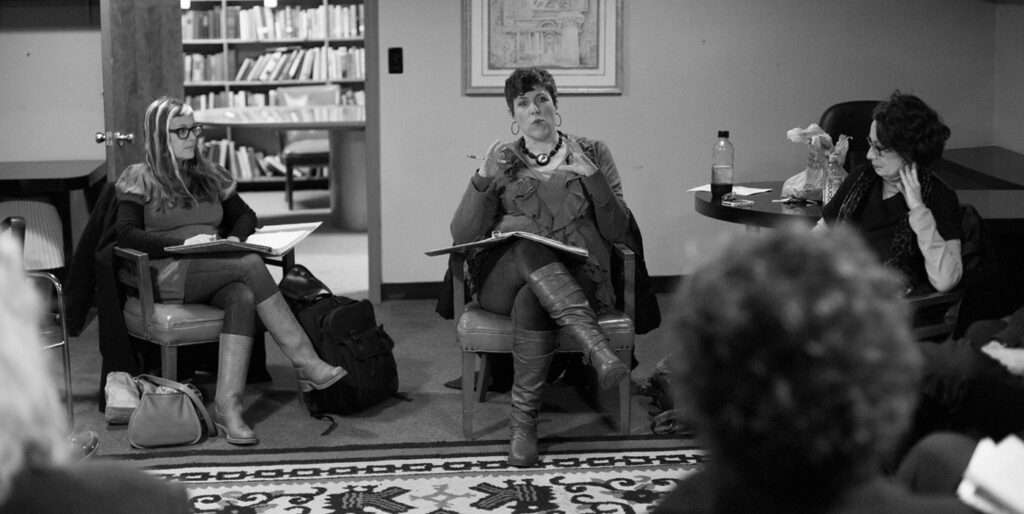
As my personal relationship with Julie deepened, we decided it would be best for her to take a backseat in the organization. She continued to host events and be our anchor emcee, but we didn’t want what was now a real job to infringe on our growing love for one another. Sari and I worked in partnership for the first 7 years of the organization. She helped solidify the workshop methodology that TMI Project still uses today.
I quit my day job. “If I’m capable of selling print advertising in 2012,” I told myself, “ I can raise enough money to support this work.” I had no idea how hard it would be to launch a nonprofit, but nonetheless, I took a leap of faith and dedicated all of my efforts to TMI Project full-time. We were lucky enough to. be supported almost immediately.
Once we saw that the workshop methodology wasn’t just working—it was working consistently and powerfully—we understood that it had to be shared with people who rarely had the chance to be heard. We started working with incarcerated teen boys, young mothers, and neurodivergent students. The success of these programs inspired the birth of what we then called the Community Outreach Initiative.
Our first official partnership was with the Mental Health Association (MHA) in Kingston, NY. It was here that I began to understand just how revolutionary this process was. So many of the participants, people who were often spoken for by others, now had a space to tell their own stories. This wasn’t about acting or writing talent; it was about creating a framework where anyone, from any background, could share their truth in a way that felt safe, accessible, and genuine. Every week, as the stories unfolded, I watched participants reconnect with pieces of themselves they thought were lost, claim them, and dispel the shame that had been put upon them.
The work continued to expand, and the demand was undeniable. Over the next two years, while we continued with MHA, we also started hosting new types of workshops and performances. There was What to Expect…When You’re NOT Expecting: True Stories of Slips, Surprises, and Happy Accidents, which raised funds for Planned Parenthood of the Mid-Hudson Valley. We hosted writing retreats, story slams, and more, until finally, after years of hard work, TMI Project was officially incorporated as a nonprofit in 2014, the same year Julie and I got married.
Each new project and collaboration broadened our understanding of what this work could achieve. In 2015, we celebrated our five-year anniversary, partnered with Gender at Work and UN Women, and brought fourteen gender activists from around the world together to share their stories. At the United Nations, during the Commission on the Status of Women, these women took to the stage, telling their stories from places as far-flung as Ecuador, India, Jordan, Nicaragua, Pakistan, and South Africa. It was TMI Project’s first international endeavor and marked the beginning of a new chapter. Our work was no longer confined to one stage, one town, or even one country; we were connecting voices across the globe.

One of the most powerful full-circle moments came in 2016, at our first Voices in Action showcase. It was a fundraiser, but more importantly, it was a night for the community to experience the transformative power of true storytelling up close. Among those we honored that night was V (formerly Eve Ensler), whose influence, through The Vagina Monologues, had been a guiding star for me back when I started my first theater company. Watching her in awe of the evening’s storytellers, applauding their courage and their voices, bowing to them; it was a powerful testament to how far we had come.
As this preordained tale continued to unfold, V brought Celeste Lecesne, co-founder of The Trevor Project, to be her date that night. After the event concluded, Celeste grabbed both of my hands, looked me in the eyes, and said, “I know what I’m doing for the rest of my life!” “You do?” I asked. “Yes, I’m working with you!”
His declaration was sincere, and before I knew it, we partnered to create Lifelines: Queer Stories of Survival, which took on a life of its own with the courage of ten LGBTQIA+ storytellers who shared their journeys about making a life-saving call to The Trevor Project Lifeline. Their stories, created over a 5-day workshop and performed off-broadway in New York City, raised awareness about suicide prevention and provided a beacon of hope to LGBTQIA+ youth struggling with similar challenges.

In 2017, TMI Project launched Black Stories Matter under the visionary leadership of then-board member Tameka Ramsey. Recognizing the urgent need for Black voices to be heard in their fullness and complexity, we created a Black-led program to offer radically authentic narratives as a counter to the harmful stereotypes often projected onto Black communities. Since its inception, Black Stories Matter has been led by dedicated program directors Dara Lurie and Micah, who have helped it flourish into a cornerstone of TMI Project’s programming. The program has inspired hundreds of Black storytellers from the Hudson Valley and across the country to share their truths, dismantling “stock stories” about the Black experience in America and replacing them with nuanced, personal accounts. Black Stories Matter has continued to foster a safe, empowering space for Black voices, offering stories that connect, heal, and challenge audiences far and wide.

Looking back on those first seven years, the journey wasn’t linear, but it was rooted in a singular belief: that true storytelling is transformative, not only for those telling their stories but for those who listen. We had grown from a single, unexpected night at the Rosendale Theater to a platform that could change lives, heal wounds, and foster understanding across borders. Though the growth wasn’t easy, every story we shared and every audience member we touched reaffirmed why we were here and why this work mattered.
2017 wasn’t just a monumental year for our external programming; it was also a groundbreaking year for our internal organizational development. Our team expanded. Blake Pfeil joined us in a new role: Operations Manager. He began the arduous task of taking everything that had been collecting dust in my mind, making sense of it, and documenting it to be shared with others. He helped initiate the process of organizing a vision, a service that will help ensure the mission of TMI Project outlives us all. He’s been with us ever since.
03
A Storytelling Movement in Full Bloom
In 2020, amid the uncertainty and isolation of the pandemic, and in step with the rest of the world, we moved our workshops and performances to the virtual stratosphere. Relocating into this digital realm, at a time when deep connection was so needed and in-person events weren’t possible, felt like a necessity and an experiment. After some trial and error, we realized that it not only worked, but we were now able to host workshops with storytellers from all over the world and invite international audiences to every show.
Simultaneously, we launched the award-winning and critically-acclaimed podcast The TMI Project Story Hour. This ongoing collection of narrative audio became a place to feature the voices of our storytellers, amplifying the very mission that has defined us from the start. Through each episode, listeners were drawn into stories that might otherwise remain hidden, told by voices from all walks of life. The podcast didn’t just extend our reach; it transformed the way we engaged with our community, offering a medium that allowed stories to resonate far beyond the walls of any theater. Whether listeners were tuning in from their living rooms or while commuting, they could feel the connection and courage of each storyteller. It was our way of affirming that storytelling could continue to build empathy and resilience, even when the world seemed to have stopped.
Building on this momentum, we turned our attention to another critical narrative. Our film Locker Room Talk addresses the need to nurture positive masculinity through social emotional learning for boys and young men. In partnership with A Call to Men, we worked with young athletes from Kingston High School, guiding them through workshops where they explored vulnerability, empathy, and authentic expression. The film follows these boys as they confront traditional masculine norms and learn to speak up against violence and sexism. Watching the transformation unfold was both powerful and humbling. In the quiet moments and difficult conversations, you could see the impact of breaking down stereotypes, one story at a time.
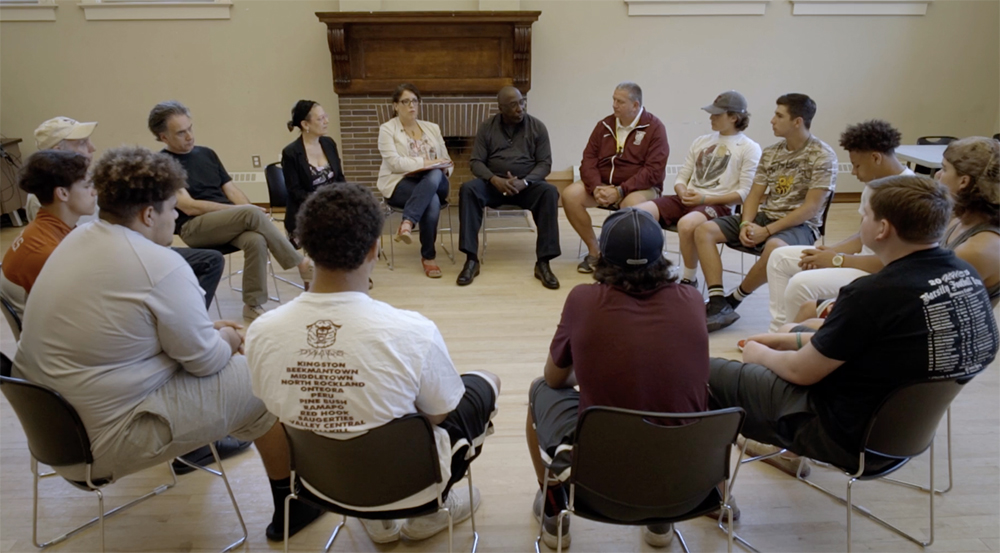
It also changed me. At my initial meeting with Coach Collins, the football coach we were partnered with from Kingston High School, we took the long walk from the front desk where he signed me in, to his office, chatting along the way. Just one minute into the conversation, I found out that he started his career at the same high school I attended, the year after I graduated. We just missed each other.
“It was my first year. I was teaching a health class but I was already using my position to offer support to issues students faced, in or out of the classroom. A girl told me she was being treated inappropriately by one of the teachers. She had a note he wrote to her to prove it.” He went on to tell me that none of the other teachers wanted to do anything about it. They defended the teacher citing how long he had been there, how he must not have meant anything by it. Just sweep it under the rug. “They were pissed at me for threatening to break the silent rules of The Old Boys Club. But, I was like, come on! There is a young girl telling us she is not safe in our school. I had to say something.” Despite being ostracized and ridiculed, he made a formal report. “I think I know the teacher you’re talking about,” I said. “He did that to me too, all four years of high school.”
I was beside myself. For years, I had revisited this experience in my own writing, over and over again. It had haunted me. But, I could never finish it. I could never find the ending. Little did I know it was because the ending hadn’t revealed itself yet. I couldn’t believe that now, 25 years later, I crossed paths with the man who unknowingly spoke up for me; that now we were brought together to teach boys how to speak up in the face of violence against women and girls. This provided closure. I finally had an end to the story.
Locker Room Talk is now making its way into schools across the country. I knew this program would be impactful. I didn’t know my involvement would be a godsend for my own healing.
Julie experienced her own radical healing as we traveled this path together. Through the TMI Project process, she relieved herself from her own shame. She was then able to do what so many of our storytellers do: take her newfound freedom and share it with others. Julie became a producer and program director at The Future Perfect Project, an organization co-founded by Celeste Lecesne dedicated to amplifying young queer voices. She also hosted No One Like You, a weekly radio show program on Radio Kingston.
In 2022, many good things happened. We hired Raine Grayson to be our full-time administrator organizer and Laura Marie Ruocco as our part-time marketing coordinator. We were finally exiting the start-up phase with a more robust team. It was a blessing that this was the year we developed stronger foundational support because it was the same year Julie was diagnosed with breast cancer. It was devastating news but honestly, Julie didn’t skip a beat. She knew firsthand what to do in the face of adversity: live big and share her story. She shared her experience living with metastatic triple negative breast cancer on her blog, America’s Next Top Cancer Patient. She inspired many people to get mammograms and other preventative screenings.
For me, perhaps the most full circle moment to date happened at the Stories for Choice performance in 2023. Nakinti Besumbu Nofuru, a storyteller from Cameroon, Central Africa, stepped onto the stage and shared her abortion story, a story she had never spoken out loud before.
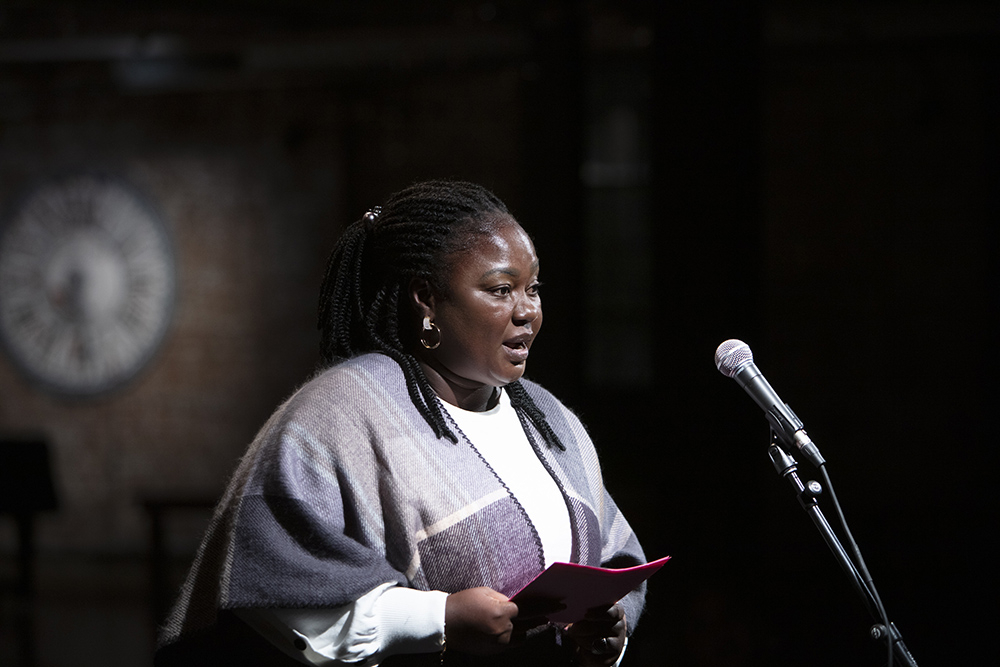
She recounted the abuse she endured at the hands of a doctor during what was supposed to be a safe medical procedure. Her bravery in telling that story left the room breathless. I sat between Julie and V. We all watched and wept. There was a moment I will never forget. Nakinti wrapped up her story with a powerful declaration to bring this healing work back to her village to help the women and girls of her community. Julie, my partner in love and in this work, had her arm around me. V and I held hands. I could feel the power of the past as my fingers intertwined with the woman who had courageously and relentlessly carried out her life’s mission which in turn paved the path for my life’s work. I was firmly placed in the present moment, captivated by the power of Nakinti’s storytelling unfolding before my very eyes. And, I could see into the future, one in which this work was making its way into all corners of the earth.

As fate would have it, that evening, a group of high school students from the Period Power! Club from the Kingston High School volunteered at the event. After listening to the stories that night, they expressed a desire to create something similar, and soon after, Period Power! Stories was born.

The last project Julie and I produced together was the perfect culmination of our work, One Story at a Time: Celeste Lecesne. It’s a beautiful docushort about our beloved friend whose true story inspired the inception of The Trevor Project. Through this film, we were able to bring his message of survival and visibility to a broader audience. It reminded us why storytelling is more than an art form; it’s a lifeline. Watching Celeste’s journey affirmed that this work, at its best, creates safe spaces and a sense of belonging for those who need it most.
In 2024, One Story at a Time: Celeste Lecesne traveled the film festival circuit, touched audiences across the country, and received numerous awards. Julie was too sick to accompany me to screenings. While we would have given anything to sit in a theater together and watch our film on the big screen, she cared most about what happened next; making sure that this piece has a lasting impact, especially in improving the lives of LGBTQIA+ youth.
Now, with One Story at a Time: Celeste Lecesne, Locker Room Talk and Period Power Stories, we are set to inspire the next generation of storytellers. We can’t wait to see where these stories will travel next and are already looking forward to the new chapters that lie ahead. This journey is far from over; it’s just getting started.
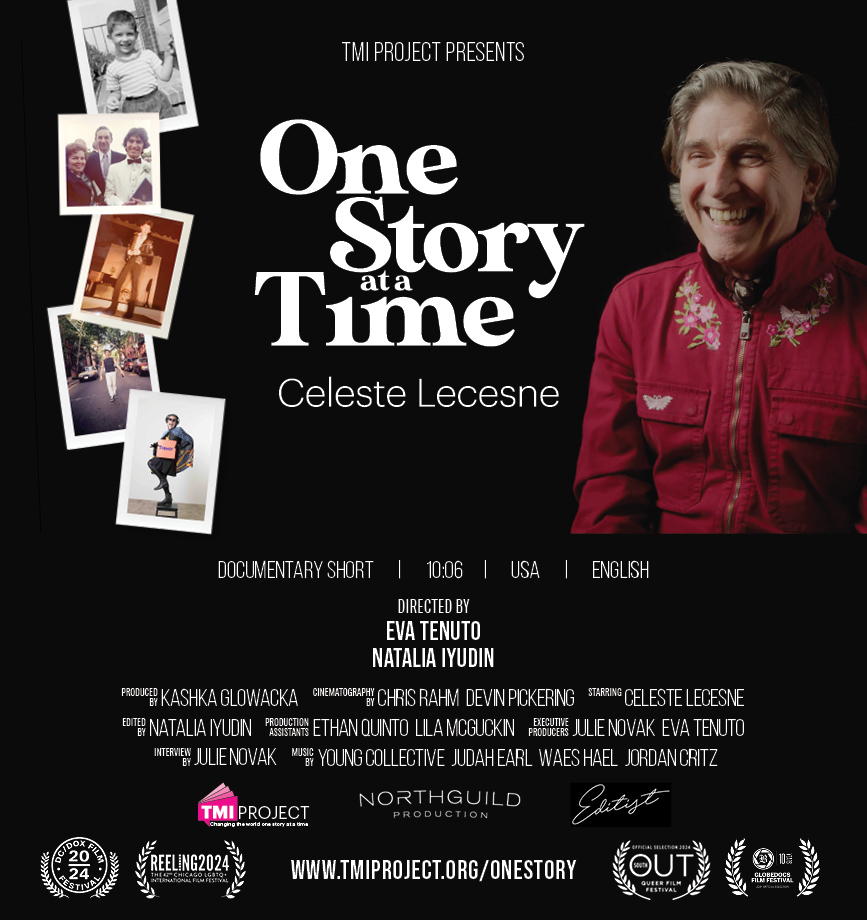
Julie passed away on August 31, 2024. I lost my partner in love and life, and the entire TMI Project community lost a legendary beacon of light. Being there for young people was Julie’s driving force. She spent her life becoming the superhero she longed for in her youth. As she often said, “Storytelling can help someone turn their kryptonite into their superpower!” She helped hundreds of young people do just that. All of us at TMI Project are dedicated to honoring Julie’s legacy by deepening our commitment to bring this transformative work to even more people. In 2025, we are excited to expand three programs dear to Julie’s heart, all of which will serve young people, both locally and nationwide.
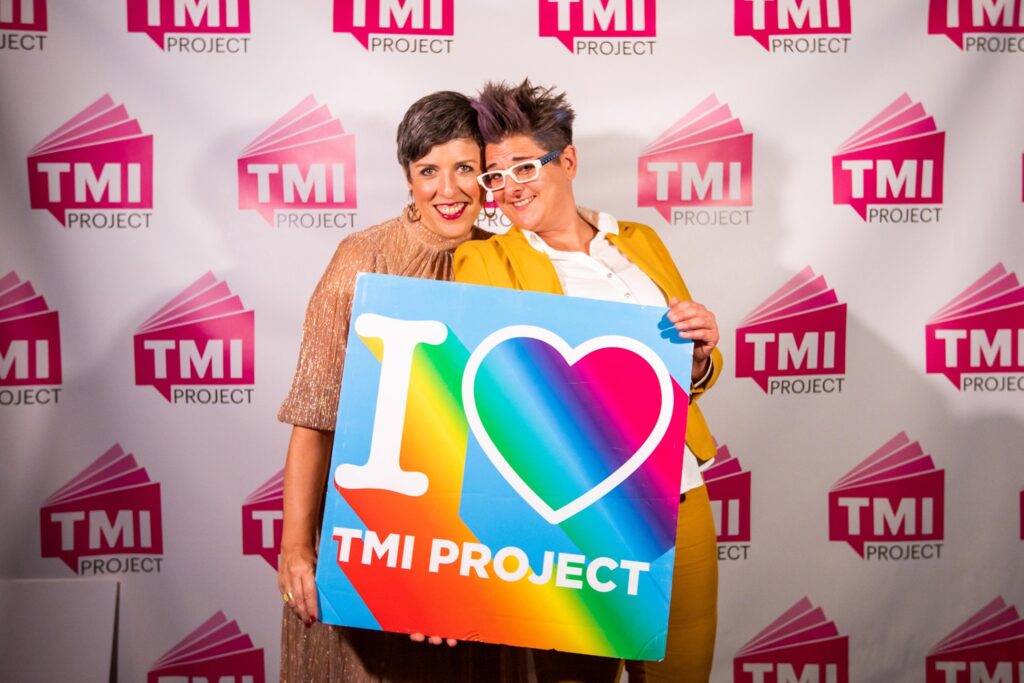
We recognize that our mission is more vital than ever. In a world where the freedom to speak openly and live authentically is increasingly at risk, we’re committed to expanding our reach and deepening our impact. With you by our side, and Julie’s spirit guiding the way, we know we can do anything. Together, we can protect the right to share our stories and continue transforming lives, one story at a time.
Thank you for helping us get here and supporting us along the way—we couldn’t have done it without you.
In love and gratitude,
Eva
I want to give proper thanks to all of those who have contributed to our work along the way. Between my memory and the 15 year timespan, I am sure to accidentally leave some folks out. Please know I am grateful to you all.
First and foremost, to our current dream team:
Advisory Board:
- Celeste Lecesne
- Gwen Wright
- Mary Stuart Masterson
- Tony Porter
- V
Board of Directors:
- Erica Brown
- Darnell Pierce
- Kyra Greweling
- Maureen Bowers
- Michael Raimondi
Staff:
- Blake Pfeil
- Dara Lurie
- Laura Marie Ruocco
- Raine Grayson
Workshop Leaders:
- Blake Pfeil
- Dara Lurie
- Hayley Downs
- Micah
- Perla Ayora
- Raine Grayson
Contractors:
- David Brownstein
- David Cagan
- Kashka Glowacka
- Tyler Epps
- Vera Gutmann
- Lauren Fallon
- Sari Botton
Intern:
- Saniya Stewart
Past Board Members, Staff, and Contractors:
- Amy Day
- Ashley Knox
- Bailey Buckles
- Beth Davenport
- Carl Weldon
- Carrie Wykoff
- Cece Suazo
- Chelsea Miller
- Chris Rahm
- Christine LaBoy
- Clare Dimaiolo
- Clarissa Marie Ligon
- Crystal Schachter
- Dacia Clay
- Dariel Vasquez
- Destiny Campbell
- Devin Pickering
- Elijah Jackson
- Erica Pivko
- Erik Harris
- Erik Kwak
- Holiday Simmons
- Ilene Cutler
- Jamie Smith
- Jeff Roda
- Jennifer Swantz
- Jessica Tobey
- Jessieca McNabb
- Julia Frodahl
- Kiepoli Calnek
- Lily Glasser
- Marlan Barry
- Maureen Gittelman
- Megan Olivera
- Michel Gaylin
- Natalia Iyudin
- Nora Culhane
- Patty Curry
- Quay Smith
- Rennie Scott-Childress
- Riley Gibbons
- Ryan Amador
- Sara DeRose
- Sean Crozier
- Shantae Howell
- Shawaine Davis
- Sophia Urrutia
- Stefan Lisowski
- Stevie Manns
- Tameka Ramsey
- Vincenza Dante
- Yuval Dinoor
